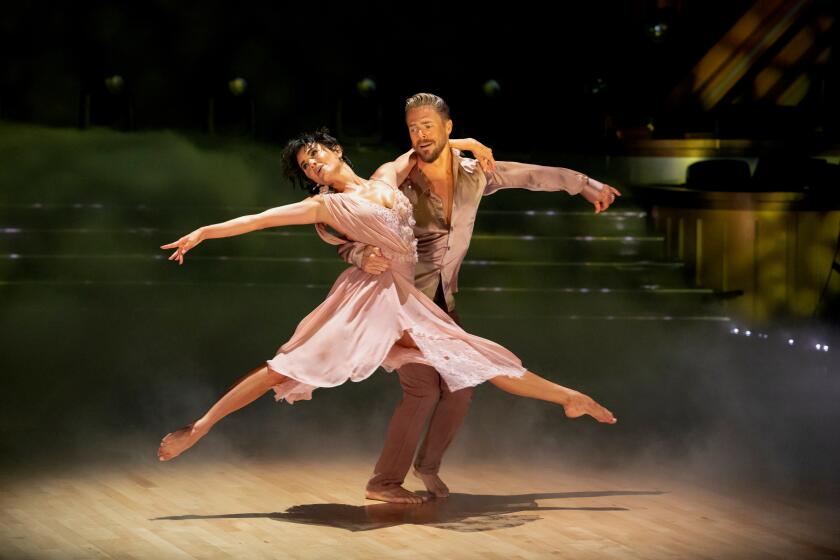STAGE REVIEW : A Disjointed âThree Sistersâ in La Jolla
LA JOLLA â Itâs difficult to tell just where the La Jolla Playhouseâs inaugural production of the season, Chekhovâs âThree Sisters,â went awry, but one suspects it was early on.
Perhaps it started with the creamy sumptuousness of John Arnoneâs opening set--an inviting, high-ceilinged room with big windows and lots of flowers that looks more like an airy La Jolla mansion to be profiled in Architectural Digest than an estate in âa provincial city in Russia at the turn of the century,â where one doubts that they had heard of bleached and pumiced wood floors.
Gorgeous? Yes--and especially gorgeous under Peter Maradudinâs exquisite, tree-filtered lighting design. But wrong for the Victorian time and the oppressive place. Wrong also for the inhabitants and habitues of this outpost, each one trapped in his or her own way and desperate to leave, yearning for a proverbial Moscow that couldnât possibly live up to expectation.
In contrast to last seasonâs âThe Cherry Orchardâ staged by Tom Moore, whose Heidi Landesman design was sufficiently lacy and impressionistic to convey a sense of place rather than provide it literally, this âThree Sistersâ is rooted in literalness. It plods along to an excruciatingly drawn-out end.
The trick in Chekhov, of course, is to accomplish a sense of tediousness without creating tedium. This is achieved by the emotional interlocking of the characters, tiny revelations that show them gradually to be complicated, fundamentally and often helplessly interdependent people we learn to love for all their seeming alienation.
So design aside, the heart of the problem in this âThree Sistersâ is a company of actors that does not interrelate. Despite (or because of?) some stellar presences, each actor speaks the lines in a personal vacuum that rarely seems to address, let alone include, anyone else. The result is a production that consists of disembodied pronouncements. Never has the Jean-Claude van Itallie translation sounded more flat or impotently mired in repetitiveness, even gleaning a few unintended titters at Sundayâs opening. âIâm 24 ,â moans youngest sister Irina (Phoebe Cates) in a fit of depression, âIâve been working a long time. My brain is dried out. . . .â
Amusing? Yes but no, since, for whatever reasons, director Des McAnuff was unable to get his actors to coalesce under some viable concept and lines such as these tend to come off as irritatingly silly instead of pathetic or funny.
Nancy Travis (so fine in last seasonâs âMy Children! My Africa!â) gives us the most stony-faced Masha, the middle sister, in memory. There is not a spark of ardor between her and Michael McGuireâs disconcertingly bland Vershinin, the brigade commander who wanders into this household and upsets its fragile balance. With this central failure of relationship, the play is sterilized.
Jon Lovitz, as Mashaâs self-important schoolteacher husband Kulygin, wanders in and out of the action seemingly lost in a play of his own, while Laura Innes, as the prosaic oldest sister Olga, talks about her frustrations--in a strange accent, often hysterically--without making us feel them. The same applies to Mitchell Lichtensteinâs vacant Andrei, the weak brother babied by his sisters and married to the vulgar Natasha. In lieu of developing a character as Natasha, Susan Berman screeches.
And so it goes. Except for Kate Wilkinsonâs shallow and sturdy Anfisa and Michael Constantineâs dismaying Chebutykin (a performance without a compass or a clue), the peripheral characters fare slightly better. Michael Harris is a subtly sinister Solyony and Robert Picardo an amiable Tuzenbach who, ironically, may be a little too good-looking for the role. When Olga tells Irina to marry him, even though âheâs not handsome,â itâs one more inconsistency in this wildly inconsistent show.
Patricia McGourty has dressed everyone appropriately and Michael Rothâs music and sound are up to his usual excellence. A showy change of scene from a nondescript interior bedroom (at the start of the second half) to the estate deck and garden surrounded by the trunks of silver birch is nicely underscored by a little girl (Cherina Eisenberg) playing a solo violin.
Itâs a typical McAnuff fillip of the sort this play could use more of. Instead, this âThree Sistersâ grinds misguided to its demise at an enervating crawl--expiring on that bleached and pumiced deck not a moment too soon.
âThree Sisters,â La Jolla Playhouse, Mandell Weiss Theatre, UC San Diego, La Jolla Village Drive and Torrey Pines Road, La Jolla. Tuesdays-Sundays, 8 p.m.; matinees Saturdays-Sundays, 2 p.m. Ends June 16. $21-$29; (619) 534-3960). Running time: 2 hours, 45 minutes.
âThree Sistersâ
Laura Innes: Olga
Nancy Travis: Masha
Phoebe Cates: Irina
Mitchell Lichtenstein: Andrei
Susan Berman: Natasha
Jon Lovitz: Kulygin
Michael McGuire: Vershinin
Michael Harris: Solyony
Robert Picardo: Tuzenbach
Michael Constantine: Chebutykin, the doctor
Josh Sebers: Second Lieutenant Fedotik
Bruce Ladd: Second Lieutenant Rode
George Hall: Ferapont
Kate Wilkinson: Anfisa
Karenjune Sanchez: A maid
Cherina Eisenberg: Violinist
The play by Anton Chekhov. Translator Jean-Claude van Itallie. Director Des McAnuff. Sets John Arnone. Lights Peter Maradudin. Costumes Patricia McGourty. Music and sound Michael Roth. Sound design Kenneth Ted Bible. Dramaturge Robert Blacker. Stage manager Wendy Beaton. Assistant stage manager Debbie Falb. Vocal coach Elizabeth Terry. Movement coach Bonnie Johnston.
More to Read
The biggest entertainment stories
Get our big stories about Hollywood, film, television, music, arts, culture and more right in your inbox as soon as they publish.
You may occasionally receive promotional content from the Los Angeles Times.










